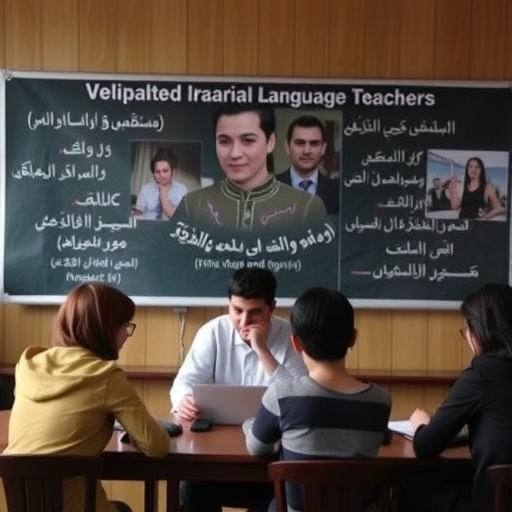In a groundbreaking study set to be published in 2025, researchers have explored the intricate dynamics of autonomy support and thwarting in relation to the mental well-being of Iranian early career language teachers. This examination comes at a critical time as educational systems worldwide are increasingly recognizing the importance of mental health in teaching environments. The study, spearheaded by Salmani Ghasemzadegan, Xodabande, and Koleini, casts a spotlight on the challenges faced by early career educators in Iran, bringing to light the nuanced interactions between autonomy and teacher morale.
The research takes place against the backdrop of a rapidly changing educational landscape where early career teachers are often under intense pressure. These educators are in a unique phase of their careers, grappling with the dual responsibilities of adapting to their professional roles while also striving to develop their personal teaching philosophies. The findings from this study aim to inform better support structures for these teachers, ultimately impacting their effectiveness in the classroom.
One of the key concepts examined in the study is the notion of ‘autonomy support.’ Autonomy support refers to the degree to which teachers feel they have the freedom to make choices in their teaching practices. In this research, the authors argue that feeling supported in making professional choices is paramount for the psychological well-being of educators. It has been documented that when teachers have the autonomy to adapt their instruction methods based on their individual style, they are more likely to engage positively with their students, which creates a more enriching learning environment.
Moreover, the study highlights the phenomenon of autonomy thwarting, which encompasses the obstacles that hinder educators from exercising their autonomy. This could include rigid curricula, lack of administrative support, or cultural expectations that dictate teaching methods. The researchers emphasize that understanding autonomy thwarting is crucial, as it can lead to feelings of frustration and inadequacy among teachers. This emotional toll can undermine their overall job satisfaction and impact student learning outcomes.
Through rigorous qualitative and quantitative analyses, the authors gathered data from a sample of early career language teachers in Iran. The research methodology involved surveys and interviews, providing a comprehensive view of the realities these teachers face. The insights gleaned from this data underscore the pervasive impact of autonomy support, or its absence, on teachers’ psychological and emotional well-being.
The implications of these findings extend far beyond individual mental health—there are pedagogical considerations to be made as well. When teachers experience high levels of autonomy support, they are more likely to introduce innovative teaching practices. This aspect is particularly significant in language teaching, where creativity in instruction can lead to enhanced outcomes for students. The study posits that in an educational environment where teachers feel empowered, they can cultivate a more engaging and stimulating classroom atmosphere for their students.
Additionally, the researchers propose actionable strategies for educational leaders and policymakers. They stress the importance of creating systems and contexts that foster autonomy support among educators. This might include professional development programs that prioritize teacher input or structures that allow for more flexible curricula. By addressing the issue of autonomy thwarting, school systems can improve not only teacher well-being but also student success.
The research also delves into cultural factors that may influence the extent of autonomy support within Iran’s unique educational context. Understanding the societal norms surrounding teaching and authority can offer deeper insights into why certain dynamics exist. This cultural lens is essential for creating solutions that are not only effective but also culturally sensitive and relevant.
Furthermore, the study contributes to the growing body of literature on teacher well-being, which has gained traction in recent years. The findings from this research can serve as a catalyst for further studies aimed at enhancing teacher support mechanisms worldwide, as mental health is becoming an increasingly critical issue in educational settings globally. The interactions between autonomy, psychological well-being, and effective teaching methods are facets that merit ongoing investigation.
As discussions around the importance of teacher mental health continue to proliferate, the insights from this study are likely to resonate with educators and administrators alike. The call to action is clear: education systems must prioritize strategies that cultivate environments of autonomy support to enhance the well-being of their teachers.
In conclusion, the pioneering research led by Ghasemzadegan and colleagues offers a pivotal exploration of the factors influencing the well-being of early career language teachers in Iran. As they navigate their formative years in the profession, the right support structures can magnify their impact on students. Thus, fostering autonomy support not only aids teachers in their professional journeys but ultimately enriches the educational experiences of their students.
Subject of Research: The role of autonomy support and thwarting in the well-being of early career language teachers in Iran.
Article Title: Exploring the role of autonomy support and thwarting in the well-being of Iranian early career language teachers.
Article References:
Salmani Ghasemzadegan, R., Xodabande, I., Koleini, N. et al. Exploring the role of autonomy support and thwarting in the well-being of Iranian early career language teachers.
Discov Psychol 5, 36 (2025). https://doi.org/10.1007/s44202-025-00368-x
Image Credits: AI Generated
DOI: 10.1007/s44202-025-00368-x
Keywords: autonomy support, autonomy thwarting, teacher well-being, early career teachers, Iranian education, mental health, language teaching, educational support systems.




